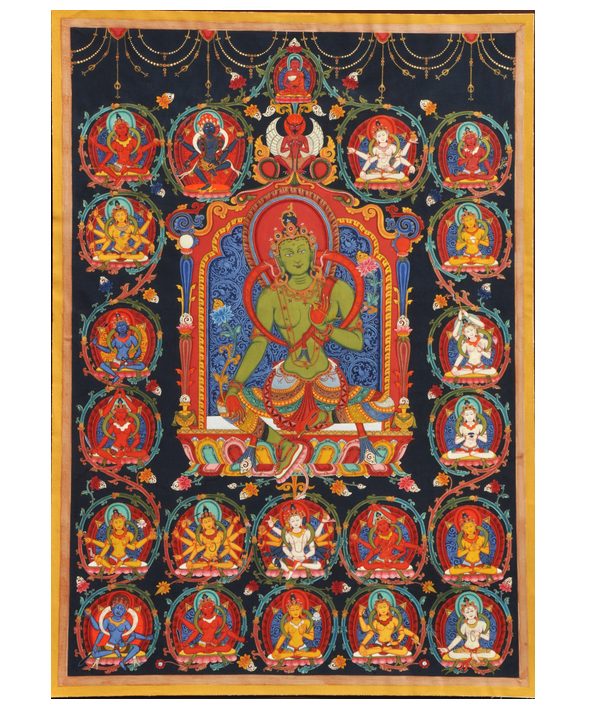
Highlights
- Newari religion painting
- painted Style: 14 century
Materials: Real Natural Mineral Pigments, 24K Gold Paint Embellishment, Cotton Canvas
Size:(56x79cm)
Description:
Tara, Tibetan Sgrol-ma, Buddhist saviour-goddess with numerous forms, widely popular in Nepal, Tibet, and Mongolia. She is the feminine counterpart of the bodhisattva (“buddha-to-be”) Avalokiteshvara. According to popular belief, she came into existence from a tear of Avalokiteshvara, which fell to the ground and formed a lake. Out of its waters rose up a lotus, which, on opening, revealed the goddess. Like Avalokiteshvara, she is a compassionate, succoring deity who helps men “cross to the other shore.” She is the protectress of navigation and earthly travel, as well as of spiritual travel along the path to enlightenment.
In Tibet she is believed to be incarnate in every pious woman, and the two wives—a Chinese princess and a Nepali princess—of the first Buddhist king of Tibet, Srong-brtsan-sgam-po, were identified with the two major forms of Tara. The Green Tara or Arya Tara was believed to be incarnated as the Nepali princess. She is considered by some to be the original Tara and is the female consort of Amoghasiddhi, Dhyani-Buddha, one of the “self-born” Buddhas. She is generally shown seated on a lotus throne with right leg hanging down, wearing the ornaments of a bodhisattva and holding the closed blue lotus (utpala).
The White and Green Taras, with their contrasting symbols of the full-blown and closed lotus, are said to symbolize between them the unending compassion of the deity who labors both day and night to relieve suffering. Under the influence of Tibetan Buddhism the different forms of Tara multiplied to a traditional 108. Tibetan temple banners frequently show 21 different Taras, colored white, red, and yellow, grouped around a central Green Tara. The figure of the “self-born” Amitabha Buddha is often shown in her headdress, as she, like Avalokiteshvara, is considered to be an emanation of Amitabha.
The main Tara in this painting is Aryatara.
The other 20 Taras are:
1. Bhrikuti Tara
2. Mahashanti Tara
3. Mangalaloka Tara
4. Raja Nisudana Tara
5. Paripachaka Tara
6. Sukha Sadhana Tara
7. Jagadvashi Tara
8. Vijaya Tara
9. Shoka Vindona Tara
10. Duhkha Dahana Tara
11. Vashitottamada Tara
12. Sukha Sadhana Tara
13. Vadi Pramardaka Tara
14. Kanakavarna Tara
15. Trailokya Vijaya Tara
16. Humsvara Nadini Tara
17. Pravira Tara
18. Ushnishavijaya Tara
19. Paripurana Tara
20. Chandrakanti Tara
Note-The above painting is Free from Shipping charge for the price and Details Please Contact us at ssuwal@mos.com.np or +977-9851098930
